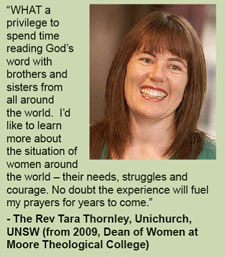The massive undertaking that is the Global Anglican Future Conference or (GAFCON) is days away from starting in Jerusalem.
Archbishop Peter Jensen, along with the Bishop of North Sydney, Glenn Davies and the Academic Dean of Moore College, Dr Mark Thompson will be meeting this week in Jordan with the conference leadership team in preparation for the seven days of prayer, bible study and fellowship that will follow in Israel.
Dr Jensen has told sydneyanglicans.net that he’s expecting to find a buzz among the 1000 who will gather.
“I’m expecting to find a great number of people thoroughly committed to the Bible and to the Lord Jesus Christ, fellowshipping together, working on who we are as Anglicans and then working on the future. It’s going to be one of the most significant events, I think, in the Anglican Communion, at least in this next two or three decades.”
Referring to the radical actions of liberal bishops in North America, who defied the will of the last Lambeth conference, Dr Jensen says: “They’re facts, they’ve happened. We now need to work out where we go from there.”
The Archbishop says the Jerusalem meeting was not going to ‘ape’ the Lambeth conference.
“This is a conference about the future and we’ve deliberately invited lay people, clergy and others with a view to asking younger people to be present because we want to ask the question, what is ‘Anglican’? and to gear up people for the future. How can we best serve God, how can we honour his word and how can we best make his message known? They’re the big themes we’ll be looking at.”
GAFCON’s 1000 prepare for ‘pilgrimage’
The time in Jordan will include consultations with bishops from majority-Muslim countries and then switch to Jerusalem where most delegates will arrive for the opening on Sunday night, June 22.
The idea first formed at a meeting of primates and other leaders in Nairobi in December.
Although originally thought to be a meeting for only 800, it has now grown to 1000, despite the difficulties of organising the program, hotels, venues and travel arrangements to the Middle East in only six months.
Archbishop Peter Jensen was elected to chair the Program Committee and has pulled together speakers from across the globe to, in the words of the conference goals, “Prepare for an Anglican future in which the Gospel is uncompromised and Christ-centered mission a top priority.”
Others in the leadership team include British bishops, Michael Nazir Ali and Wallace Benn, the Primate of Nigeria, Archbishop Peter Akinola, Archbishop Greg Venables of the Southern Cone, and Archbishop Benjamin Nzimbi of Kenya.
The statistics are in GAFCON’s favour " the bishops planning to attend make up about one-third of the total invited to Lambeth and their provinces represent 75 per cent of the world’s Anglicans.
The conference comes amid a massive publicity tour by American homosexual bishop Gene Robinson.
The idea of an Anglican bishop saying he ‘always wanted to be a June bride’ was good copy for the world’s newspapers but only served to further bewilder a public which had already lost touch with the basics of the Christian faith.
A word from some Sydney Anglican delegates
One of the GAFCON delegates, the Rev Rick Smith, from Naremburn-Cammeray Anglican Church, is straightforward.
"You don't have to be that clever to realise that the worldwide Anglican communion is in a bit of a mess. It seems we have reached the point, in many places, where practices historically and biblically rejected as harmful sin, are now paraded as good. And doctrines historically and biblically rejected as error are embraced as truth.”
But Mr Smith finds some bright spots.
“I have been greatly encouraged by the faithfulness of those in Africa and Asia, where Christian witness is clearer and Christian leadership has taken a stand. I look forward to going to GAFCON, mainly to listen and learn. I also want to encourage clear gospel partnership. “
 The Rev Tara Thornley (pictured) is also enthusiastic.
The Rev Tara Thornley (pictured) is also enthusiastic.
As well as plenary sessions, the GAFCON delegates, styled as ‘pilgrims’, will visit traditional sites such as the Mount of Olives, Bethlehem and Galilee.
Dr Jensen says the conference had to be in Jerusalem.
“This is where the great events of the Christian faith had their origin and I believe that there was an overwhelming sense that in these times of great crisis, it would be good to go back to where it all started and to remind ourselves that we’re dealing here with an historic faith.
“This is not a make believe faith, its not a faith that people can play around with and just have the bits they like and the bits they don’t like.
“This is an historic faith and to go back to where it started is a symbol of our determination to see it as God revealed it to us.”




























